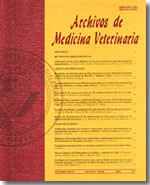PCR identification of Brucella canis in canine blood and milk. A case report
Main Article Content
Abstract
Canine brucellosis is a disease caused by Brucella canis that is associated to reproductive problems in dogs, and it is also known as zoonosis. These bacteria are excreted in urine, milk, fetus or semen of infected animals, and the transmission occurs via sexual, oral, nasal or conjunctival contact. Diagnosis is usually done through serology but confirmation requires isolation of bacterial culture, a costly process that requires laboratory biosafety level 3. Molecular techniques are a valid method to determine the bacterial DNA, offering high specificity and sensitivity. This study reports the evaluation of a PCR test usually applied to isolates, as a test for clinical use. A healthy female canine with a history of previous brucellosis, feeding her 4-day old healthy newborns, was submitted to a rapid serologic test with 2ß-mercaptoethanol, haemoculture and PCR, of milk and blood. All the tests resulted positive to Brucella canis. This is the first report of a positive result to B. canis by PCR and it confirms that clinically healthy individuals shed the bacterium through milk, representing a risk of infection for neonates and humans.

